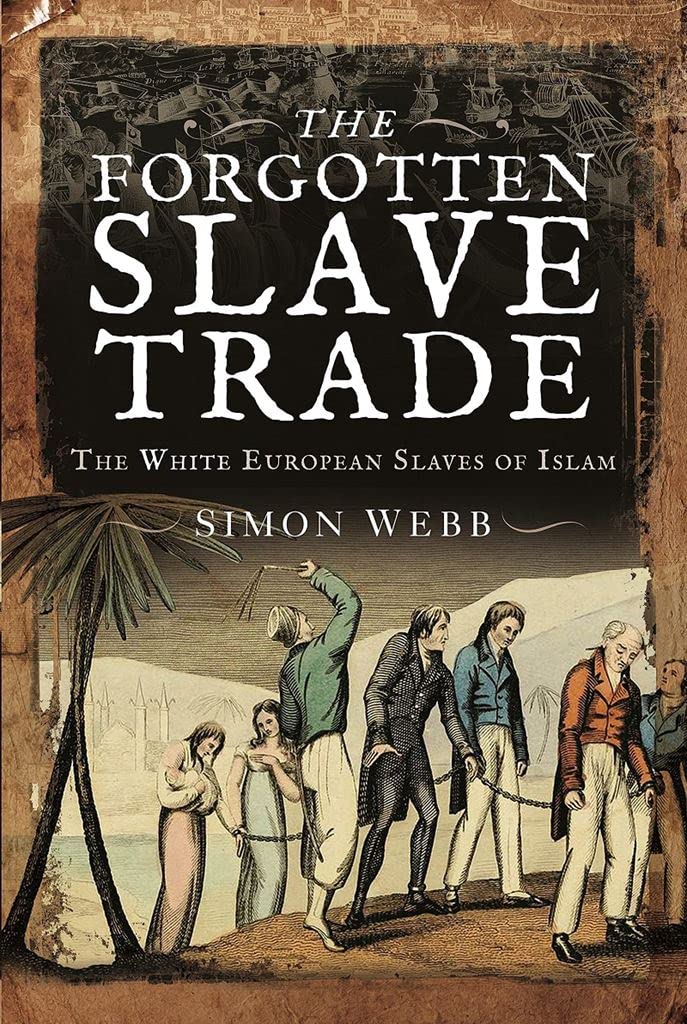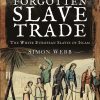The Forgotten Slave Trade: The White European Slaves of Islam
£11.60£14.20 (-18%)
A century before Britain became involved in the trans-Atlantic slave trade, whole villages and towns in England, Ireland, Italy, Spain and other European countries were being depopulated by slavers, who transported the men, women and children to Africa where they were sold to the highest bidder. This is the forgotten slave trade. Starting with the practice of slavery in the ancient world, Simon Webb traces the history of slavery in Europe and examines the experiences of those who were forcibly taken from their homes. He describes how thousands of European boys were castrated and then sold in Africa and the Middle East, and also explains how the role of the newly-independent United States helped to put an end to the trade in European and American slaves. He also discuss the importance of towns such as Bristol, which had been an important staging-post for the transfer of English slaves to Africa over 1,000 years before it became a major centre for the slave trade in the eighteenth century. Reading this book will forever change how you view the slave trade and show that many commonly held beliefs about this controversial subject are almost wholly inaccurate and mistaken.
Read more
Additional information
| Publisher | Pen & Sword History, Reprint edition (15 Nov. 2021) |
|---|---|
| Language | English |
| Paperback | 208 pages |
| ISBN-10 | 1526797097 |
| ISBN-13 | 978-1526797094 |
| Dimensions | 15.24 x 1.91 x 22.86 cm |










by Kindle Customer
Good eBayer.
by Gandalf as Well
One of the best books on the subject, which has been politically hijacked by several groups and minorities.
So much so that I strongly suspect this would be considered ‘racist’, ‘unreconstructed’ and ‘untrue’ because it puts the North Atlantic slave trade into a proper context, in terms of :-
– relative numbers – it wasnt the largest number of slaves by any means;
– barbarity – it wasnt the most cruel or harsh in its treatment of the unfortunates;
– racism – it wasnt particularly racist since almost all slaves in history were taken from ‘other’ groups;
– relevance – there still many much more recent examples of state sponsored slavery;
– hypocrisy – it explodes the lie that all slavery is due solely to evil white men exploiting poor black men.
Unfortunately some people still believe the world is flat , so I dont hold out much hope that attitudes will change because of facts!
by Mr. Trevor Morgan
It is a myth that the only guilty party in slavery is Britain. But myths more often than not will trump the truth. The whole mythology behind BLM shows the to be so.
We live through a period of iconoclastic bullies who declare their myths are pure truth. They are not. They are cynical nonsense set in motion that some may seize political power and appeasement may well lead to this.
As a descendent of English and Irish paupers I will not be guilt tripped by scoundrels who would seek to destroy real history and replace it with packages of half truths and distortions.
Slavery was endemic and world wide for millennia and it was the nation’s of Britain and Denmark that started the fight against this blight.
We must not apologise for the freeing of humans from bondage
by Tony Green
I enjoyed the book.
It resurrected important facts, long since ignored or marginalised because they don’t fit the current woke narrative and thus gave them context and meaning.
If I have one minor negative observation it’s the use of the Falklands War (p.168) to justify a disingenuous point: Margaret Thatcher didn’t launch the Falklands War to win an election or distract the British voter; she merely responded with military force to a war forced upon her by Argentina and its need to distract their masses due to the Juntas’ mishandling of the Argentine economy.
That aside, this book joins others on my bookshelf which defends the British story in taking on the slavers and puts to the metaphorical sword the notion that slavery was a uniquely white and western undertaking.
Those less discerning don’t like that fact – but fact it is.
by Glen Pettifer
To start with my only negative point- I found sentences long and hard to concentrate, this may be due to my medication for epilepsy.
Onto the book…It was informative and eye opening and to be honest made me a little angry that our society is so dismissive of white slavery. I never knew how extensive white slavery was. Like the author wrote, I grew up with a guilt of what England had done to black slaves. I’m serious when I say this book belongs in every school library and should be taught in any lesson about slavery.
To the author I just want to say thank you for opening up my eyes.
by Vanam
A very welcome book at a time when we are constantly being reminded (with reason) about the horrors of the trans-Atlantic slave trade. The writer points out that slavery has goes back to ancient times, and always had the same brutal practices towards the enslaved. The book is well-researched and written in a style that is clear to any interested reader. It covers the Ottoman Empire, where it was deeply entrenched, and included slaves captured in European lands. It also highlights the largely neglected subject of the tragic seizure of slaves by North Africa traders from the British Isles.
by Erik Peterson
A must read for every American, European, British, and African person. I’m a scientist, but not a historian, indeed I hated history at school. This book is written in that perfect niche of being authoritative, having suitable (but not too many) references, and being a good and easy read. I loved the way the author linked some of the events to modern attitudes and took a clear and non partisan view of history, whilst still showing how current education in British schools and indeed in the public arena is so lacking in many aspects of British history.
Seems such important events have been sidelined for left wing poltical reasons. As a Brit working in Africa, it’s all too true that Europeans are simply viewed as colonisers and slavers and putting this in the context of a much larger history fits so much together and shows just how damaging the current antiwest rhetoric is in the media.
I definitely wish I had read this 20 years ago, but it is a modern book so I guess now is the time to get back to the real events and understand better the relationship between Europe, the Middle East, Americas, Russia and Africa. I learned far more than just about the sizeable trade in white slaves, and was actually impressed and want to read more about the development of the navy in the USA. Superb. I recommend to anyone who wants a gripping history of European slavery.
by Luksy Ann
This is a highly laudable and informative book, one which throws up inconvenient truths for the politically correct, who would rather its contents be glossed over and the idea of ‘the slave trade’ (i.e. only one, the Transatlantic trade) be perpetuated at the expense of all other slave trades. Historically, slavery has been ubiquitous, featuring in cultures as varied as the North African and the Viking , and, as The Forgotten Slave Trade reveals, Caucasians have at times been its victims and not, as some would have us believe, exclusively its perpetrators.
Another reviewer here, by the name of Molnul, states rather insidiously that he (or she) knows ‘what type of audience this book is catering for’. It appears he does not, unless (and this is unlikely) Molnul is aware that to highlight a deliberately overlooked slave trade is not to detract from the injustice endemic to the one whose evils are most often aired and condemned.